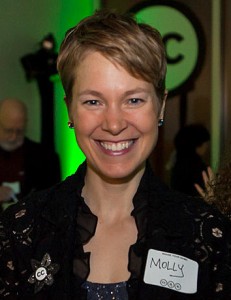
Authors Alliance Co-Founder Molly Van Houweling
On Oct. 10 I traveled to Columbia Law School to attend and speak at a symposium hosted by the Kernochan Center for Law, Media, and the Arts entitled “Creation is Not Its Own Reward: Making Copyright Work for Authors and Performers.” It was a fascinating day featuring perspectives from creators in a variety of fields—including drama, non-fiction authorship, photography, song-writing, graphic art, and even video game design. Video from the event has now been posted and the proceedings will be published in an upcoming issue of the Columbia Journal of Law & the Arts.
I spoke on a panel entitled “Academic Perspectives.” This topic had multiple meanings for me. I am a legal academic with a scholarly interest in the relationship between copyright law and creativity. So I have an “academic perspective” on the creative environment in general. But I also have an individual creator’s perspective as the author of academic articles on my scholarly topic (and of course as a founder of Authors Alliance). In my remarks I emphasized the legal and practical obstacles that academic authors often face when they want to ensure that their books and articles are accessible to readers even after those works have outlived what in many cases is a fleeting commercial life.
I explained that academic authors sometimes transfer their copyrights or grant exclusive licenses to publishers without much forethought. Years later they may find that they want to revive out-of-print books, write new editions, anthologize their own works, or simply post them on the Internet so they can be accessible to readers around the world. But these authors no longer have the right to do what they want with their own works without permission from their publishers. Renegotiation may be theoretically possible but practically difficult–especially for absent-minded professors who may have trouble even finding their original contracts (to say nothing of the sometimes difficult task of figuring out who owns rights that may have been transferred from the original publisher to someone else).
Academic authors are not alone in facing this type of dilemma. Over the course of the day, other creators described a wide variety of individual and industry practices regarding copyright, including many that contribute to problems for authors who want to reuse their own work. Most interesting of all, Pulitzer Prize winning playwright Douglas Wright described retaining and managing the copyrights in his stage plays but not in his movie screenplays. In one case he worked on a screenplay adaptation of a stage play he had written. When he later revived the play he did not include new-and-improved material he had developed for the screenplay, because that revision of his own work was a work-for-hire that he did not own. Wright expressed a strong preference for retaining his copyrights when possible and thus serving as “the CEO of my own imagination.”
This comment and many other insights throughout the day addressed individual and industry practices operating in the shadow of copyright law, as opposed to the details of the law itself. But participants did discuss some aspects of copyright law and policy and a few themes emerged. One theme was the importance of improving copyright record-keeping—making it easier for authors to register their works, for transfers of ownership to be recorded, and for potential users of copyrighted works to consult these records for purposes of contacting copyright owners. Another theme was the importance of making it easier and less expensive to resolve copyright disputes—through alternative dispute resolution, small claims tribunals, or other means. Both of these ideas are key components of the Authors Alliance Principles and Proposals for Copyright reform, and it was encouraging to hear what appeared to be consensus support for them from such a diverse set of creators. Read more about our Principles and Proposals for Copyright Reform, including how to improve information flows about copyright ownership and how to ensure that copyright’s remedies and enforcement mechanisms protect authors’ interests.
Soon we’ll have more to tell you about how authors can successfully overcome obstacles to making their own work accessible–including how to renegotiate publishing agreements (and even how to avoid losing track of them). Stay tuned!
Discover more from Authors Alliance
Subscribe to get the latest posts sent to your email.
